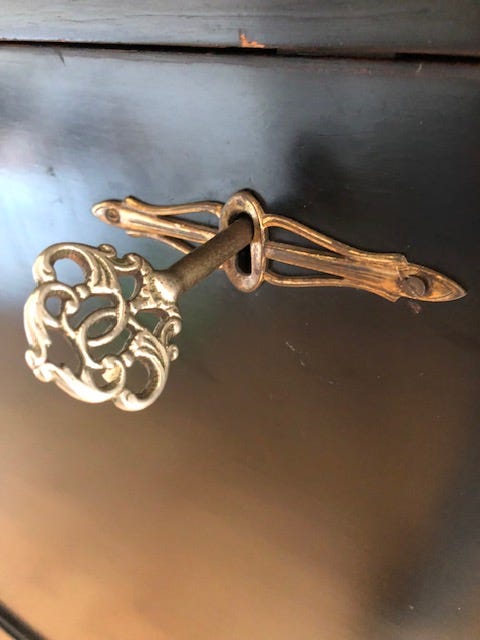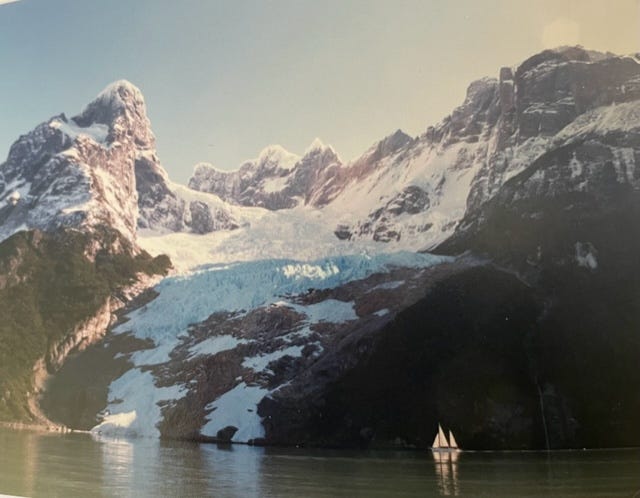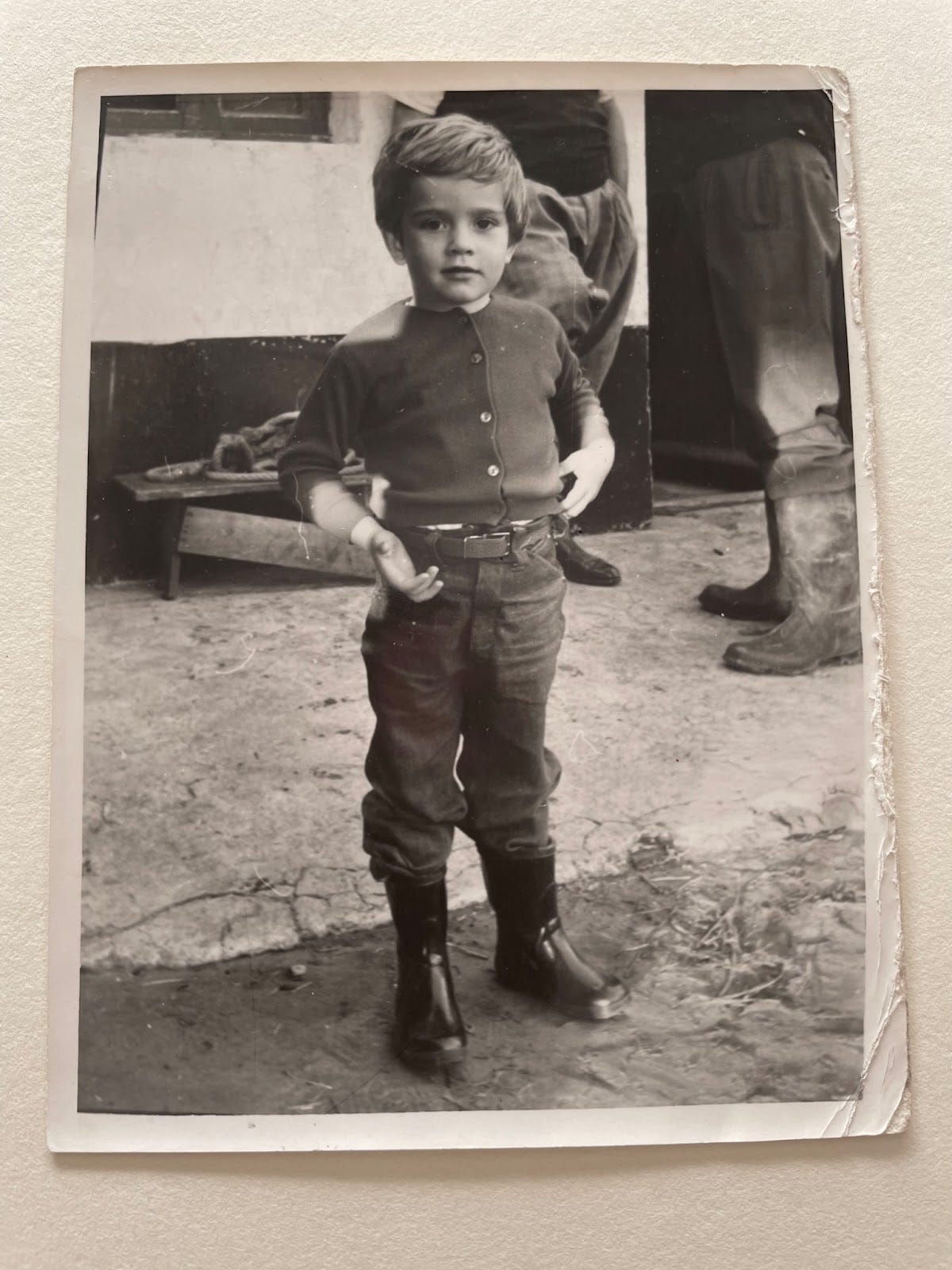“Home is not just the place where you happen to be born. It’s the place where you become yourself.” — Pico Iyer.
1. The Key in Tierra del Fuego
Stories are the only inheritance I need.
Six dates—that’s all it took for my parents to elope in Jamaica. Since then, they wandered amid CIA shadows and sticky red tape, celebrated with the Sandanistas, dwelled on a monkey-ridden island with a beat-loving recluse, rose to the top of Tenerife’s tourist sector, dodged the draft, smuggled—
They unshackle the chains of conformity.
I’ve pleaded with my father to pen his tales throughout my life. The scrawled notes, remnants of rides to school, tipsy nights, and phone calls from youth to this moment weren’t enough.
‘Schrijf verdoemme oew verhoale op!"1
He told his stories in various languages, adding layers as he code-switched and retold stories from the perspective of different idiomas. I’d beg him to write the stories in Flemish, English, Spanish, or a mix of the three.
He never listened
… until now.
Cancer has a silver lining.
Lucas
Ekeren, Antwerp, 1967
The old globe, its faded colours weathered by time, sat atop the weighty marble stand next to the only cabinet with a key.
Papa didn’t need to lock the cabinet; he knew he was the only admirer of its contents, an ever-expanding collection symbolizing his ability to savour the moment instead of letting it get the best of him. It was a collection of fine whisky, cognac or Armagnac he regularly received as a gift after piloting a ship into Antwerp.
We were alone. It wasn’t Christmas, Easter, or a birthday—so why was he opening the cabinet?
Post a pour of spirits, he trailed his index finger the size of two markers over the Atlantic Ocean to the south of the American continent. The Belga cigarette's bluish wisps veiled the northern hemisphere in a gentle haze.
"I was second mate on the SS Louis Sheid when I sailed to South America for the first time. I believe it was in 1953. Europe was still completely under construction, and Argentina was the granary of the world at that time…and there was meat, lots of meat.”
He drew me near, and together, we gazed upon the globe as if a cinematic tableau unfolded before our eyes.
“We first sailed to Rosario, a city on the Parana River, deep inland, and then on the way back, we stopped in Buenos Aires.”
"And the country is called Argentina, right, Papa?”
My father's beautiful baritone voice ensured that the names of those exotic destinations were etched forever in my memory.
"Yes, Argentina. In Buenos Aires, I even bought two records with tango music by Carlos Gardel.”
It wasn't the first time I followed Papa's finger across the globe and greedily inhaled his stories mixed with the scent of tobacco. Even as a naive little brat, I knew two things I needed to survive: to breathe and to travel.
"Were you also here, Papa?" My little finger slid to the southernmost point of the American continent where the enchanting phrase "Tierra del Fuego" arced around an island.
"No, Lucas, I've never been there. That's the end of the world.”
The end of the world. At the time, I didn’t realize it would be the beginning of a new one.
“There's a big rock called Cape Horn where it's always stormy with waves as high as the church tower in Ekeren.”
I held my breath and tried to imagine how fire and stormy seas coexisted at the end of the world.
"That's where I want to go, Papa. I want to know why it's called Tierra del Fuego.”
Twenty-four years later, I found out and understood why this was a special day. I realized what the key truly unlocked.
Catalina
The rugged glaciers and towering snow-capped peaks surrounding the Beagle Channel used to give me a sense of peace, but not today. Nothing can take my mind off the Ushuaia’s landing strip—a neglected spec in the distance too short, even for the small plane.
“¿Podemos aterrizar?”2 My husband asks, his voice too high for me to believe the forced calmness.
30-knot winds toss the little plane from side to side until a sudden drop in pressure causes the plane to drop and my insides to rise.
“Depende,” says the pilot as we level out.
“¿Qué quieres decir con ‘depende’?”3 asks my husband, saying what I want to scream.
At that moment, the pilot brings the plane down. As the landing strip approaches, I see the runway’s not long enough. Within seconds we’d be in the Beagle Channel, drowning in the freezing water.
Then—
My stomach flips as the pilot brings the plane back up.
“Depende de lo rápido que caigamos en la pista.”4 says the pilot continuing the conversation as though I didn’t just vomit in his plane—which I did. Twice.
The pilot dives the plane down again, and this time, I close my eyes and prepare for the end. When the plane screeches and slides to a stop, I finally open my eyes—the front of the plane almost hangs over the cliff's edge.
“Estamos a salvo. Todo bien,” says the pilot.
Aside from the two small towns on Isla Navarino, I felt this was indeed the end of the world, or at least where civilization stops.
Remember when I told you all those stories about kabouters, Nolan?
Well, some people in Ushuaia believed creatures like gnomes and nymphs lived in the forests. It was easy to believe.
Here, I could roam without anything holding me back. Ever since childhood, I have loved the sense of this vastness, this freedom.
I first experienced it at my aunts' farms in The Pampas of Argentina, where my cousins and I could roam like wild horses. There was nothing but grasslands between me and the horizon. And when I was five, I had to leave it all behind.
Brasschaat, Antwerp, 1967
Belgium was a cage to me.
I left my cousins and aunts, trading their blend of warmth, kisses, tears, drama, and love for the unknown faction of my family. In Argentina, I had around ten cousins, and in Belgium, I met 30 more. Thirty cousins who spoke a language I didn’t. And while they mastered the art of hushing up and sitting still, I was used to running wild, firing rifles, and getting lost in daydreams.
The shock of these vast differences turned into an obsession during my youth.
All I yearned for was a ticket back to Argentina, and like a magnet, Tierra del Fuego drew me in.
I just had to find the right key to unlock me from my cage.
This is the first story from Forever Foreign—a series designed for Substack. The short stories stand alone but hold more weight for fans who follow the series weekly.
On Saturdays, I’ll continue to write cultural psychology and sociopolitical essays related to the short stories in Forever Foreign.
If you believe my work has value and enjoy reading on a platform that doesn't steal your attention with ads, please consider becoming a paid subscriber and sharing my work with your family and friends.
Write down your stories, damn it!
Can we land?
What do you want to say with ‘depends?
Depends on how fast we drop down to the runway. At this moment, we would have gone to hell as we kicked the bucket.









This was super engaging writing, Nolan. And I loved the pictures. I'm sorry your dad is sick but I'm glad you're getting the stories now.